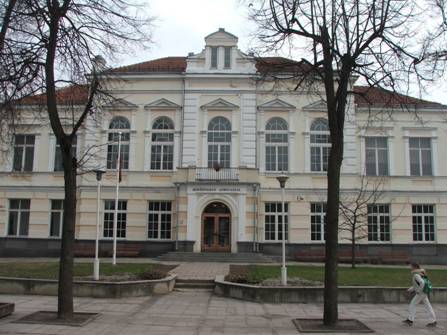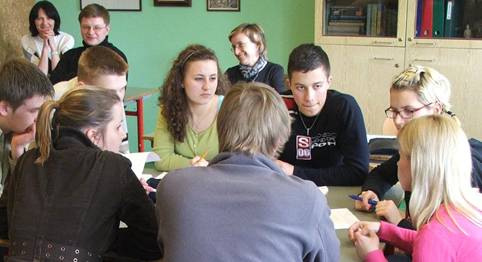EFL teacher Rima Morkūnienė shares with us her opinions on the benefits of CLIL, her experiences coordinating the International Baccalaureate programme in Siauliai and what the parents of CLIL students make of it all.
Tell us who you are and what you do.
 |
Isn’t it amazing, I’ve been with my school, the Siauliai Didzdvario Gymnasium for nearly 24 years already?!... I'm joking around with the arithmetic. I went to this school myself, then, after almost ten years after graduation from Vilnius University, Faculty of Philology, English language department, I returned to the school and started as a teacher of English. I got involved in a number of international projects, then was promoted to Deputy Head and finally, since 2005, I am an International Baccalaureate Diploma Programme Coordinator.
What are your impressions of learning subjects through English as a foreign language?
The good thing about teaching/learning subjects through English as a foreign language is that the learners become bilingual in subject(s) and become advanced compared to monolingual students. Their comprehension and production of subject-related materials in English is much better and they are more fluent in the end. They set off with foreign (English) language skills more applicable outside the classroom and school. In other words, students learning biology, history, mathematics, economics in English get used to reading subject-related texts in books, papers, on the internet, etc. discussing them in the classroom and writing texts, essays, commentaries, etc. themselves. Thus, their comprehension (reading, writing, speaking, and listening) skills naturally get ahead compared to the English as a foreign language classroom only.
But in order to succeed in learning subjects though English as a foreign language, the student has to have substantial knowledge and skills already, therefore, we test our students prior to admitting them to the IB Diploma programme. Last, but not least, the IB Diploma programme students whose mother tongue is not English, are awarded the Bilingual Diploma! So our all IB DP students get Bilingual diplomas. Isn’t that a real reward?
 |
The major challenge the students meet and have to cope with during the first term is in relation to the vast expansion of subject-related terminology and vocabulary. They need to spend a few days and nights with monolingual dictionaries becoming their best friends and bedside books but this is just the beginning. Another skill they have to work hard on is regarding formal writing style; they are often good at writing informal texts and using less a formal language and writing style but writing an essay differs a lot from a message to a friend! But they come to master that as well.
Can you give us an idea of how much of this goes on in schools in Siauliai and Lithuania generally?
I’m afraid we are the only school in Siauliai using English as a medium of subject teaching and learning; in Lithuania there one other IB DP school in Vilnius.
What are the most important issues for teachers working in English-medium education in your context?
When teachers are reluctant to start teaching in English, they usually say that their English language is ‘rusty’ compared to that of students (which is in many cases partially true); very often teachers are more fluent in reading / writing / listening than speaking and this intimidates them, but once they overcome it, then it isn't a big issue anymore. It is not a big problem if a teacher uses two languages in the classroom as long as it does not become a translation / interpretation activity. English language courses, training and mixing with only English (as a foreign) language speakers encourages them to overcome the language barrier. We are trying to send teachers to events as much as we can afford. EU funds are of great help here.
So is yours a successful (IB) programme?
Is it successful? Well, it is not a failure! The IBO Diploma programme this year (2008) celebrates its 40th anniversary! The number of IB schools globally increases every month, the number of IB DP students in our schools increases every year as well! It means that the fact of being taught and having to learn in another language other than their mother tongue - we’ve got several students whose mother tongue is Russian - is not a big issue for motivated students. Moreover, we are working on our school's straegic plan with the aim to make CLIL a part of school education policy and culture, what distinguishes us in the context of basic and secondary schools in Siauliai and probably Lithuania. We plan to include CLIL subject classes for students in the 1st and 2nd (year 9 and 10) gymnasium year depending on their level of language knowledge. For example, some students could cover a whole biology unit in English, while others could have a couple of classes to learn terms and describe processes at the end of the unit. This, we think, would give linguistic hands-on experience for students and demonstrate to them that a foreign language, in our case English, can not only be an objective in learning, but also a tool for learning.
Do you think this way of teaching is here to stay in your school, and in Lithuania, in Europe... do you think it is likely to grow?
I want to believe that this way of bilingual and CLIL teaching will stay in our school as well as in Europe; multilingualism is already, I would say, part of daily life in many European countries. In Lithuania? I would like to think so. It has already started but still more has to be done to make it a part of formal education, maybe as an alternative to monolingual teaching and learning.
Tell us a little about the impressions you get from parents about their children studying through the medium of English, what do they say about it?
The scope of parents’ impressions about their children studying subjects in English varies from enthusiasm to anxiety and worry, depending on students’ successes or struggles with the language. But in general, parents say that their kids like CLIL classes and IB DP students do not complain about it. Parents are quite happy when the IB DP students do not have to take any English language tests (consequently, no test fees) when they apply to any university in the UK, so there are no linguistic problems when they sit the SAT for the USA universities. Though, I would be lying if I said that we did not have several IB DP quitters just because it was too hard for them to shift from the usual learning style to the new one. Every rule has its exceptions!
Would you recommend your school and this form of education to others, would you be happy for your own children to study there?
A well-known phrase goes like this: The more languages you know, the more sides there are to you as a person. I do not think it is possible to be monolingual in this globalizing world anymore; learning subject content through a foreign language ‘converts’ a foreign language into a second language, fusion of content and language enables an individual to make a quantum leap in becoming more flexible, mobile and smarter in many ways. If we can be like a fish in the water in a subject in one language, why should not we do it in at least another one?
My daughter went through learning subjects in English in IB DP; now she is happily studying International Relations and Political Science at the University of Reading, UK. English for her is not only a language of instruction, but also hopefully a language which will form her future and her career.
Topics
Your perspectives
- 1
- 2
- 3
- 4
- 5
- 6
- 7
- 8
- 9
- 10
- 11
- 12
- 13
- 14
- 15
- 16Currently reading
CLIL in Lithuania: Interview with Rima Morkūnienė
- 17
- 18
- 19
- 20
- 21
- 22
- 23


No comments yet